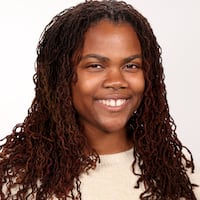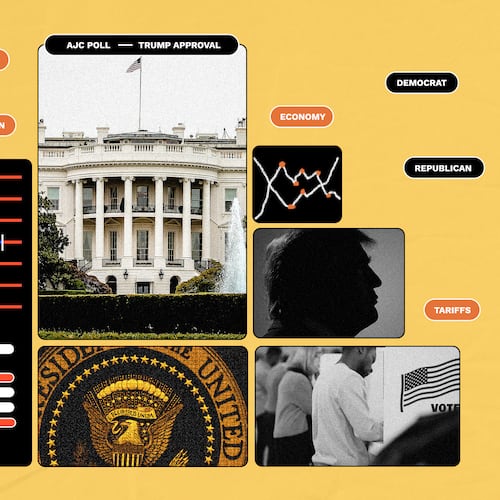One day last week, two prominent figures who have little in common politically visited two universities in Georgia with the same goal: encouraging students to register and vote in next month’s elections.
The morning visit by U.S. Sen. Elizabeth Warren, D-Mass., popular among progressives, to Clayton State University and the evening visit by Donald Trump Jr., son of the Republican president, to the University of Georgia highlight the aggressive efforts both parties are making to get every vote in what’s predicted to be a closely contested competition for control of Congress.
Former Democratic Georgia congressional candidate Jon Ossoff, 31, an elder statesman of the young voter movement, made an appeal to students for his party’s nominee for governor, Stacey Abrams, that could have been made by a supporter of Republican nominee Brian Kemp.
“Young people are going to make the difference in this election,” he said. “And if young people don’t vote, if we don’t get our classmates and our neighbors and our parents and our friends to the polls, if we don’t make that effort collectively, then we’re going to wind up with representation that doesn’t care about us. And they won’t have any reason to care about us because they’ll know we don’t vote.”
Some efforts, though, to engage students have turned sideways. A Clayton State associate professor apologized after offering extra credit to students to attend the Warren event, where Abrams spoke. U.S. Sen. David Perdue, R-Ga., was recorded briefly snatching a Georgia Tech student's smartphone Saturday after a dispute with some students. Perdue, a Georgia Tech alum, was at a football game, in part, to boost the campaigns of Kemp and Geoff Duncan in the races for governor and lieutenant governor, respectively.
Kemp, a UGA grad, has also campaigned at Georgia Bulldogs games, speaking to young Republicans groups.
Traditionally, 18- to 29-year-olds are the least likely age group of voters to cast ballots in any election, particularly midterm elections, but unprecedented work is being made to increase turnout. In addition to the Trump Jr. and Warren visits, celebrities such as singers John Legend and Janelle Monae have visited metro Atlanta campuses in recent weeks.
UGA first-year student Alexa Tomaras, 19, said the celebrity visits and engagement have helped draw in more students.
“I just think it’s really exciting that people are getting excited about politics,” Tomaras said. “It’s really interesting to see people my age getting excited about it and picking a side and actually thinking about things instead of jumping into one category based on one aspect of a political party.”
State data show younger voters are gradually becoming a larger segment of Georgia’s electorate. About 1.3 million registered voters — 19 percent of all voters — in Georgia are younger than 29, according to an Atlanta Journal-Constitution analysis of state data. In 2016, about 18 percent of Georgia’s registered voters were younger than 29, the AJC’s analysis shows.
The turnout rate in 2016 for young voters nationwide was slightly above 40 percent, far below the overall average of about 61 percent, according to U.S. Census Bureau data. Young voters typically turn out in even lesser numbers during midterm elections. Turnout was below 20 percent in 2014 and has not risen above 25 percent since groups such as the U.S. Election Project started tracking such data in 1986.
Kennesaw State University political science professor Kerwin Swint said most young people don’t vote because many haven’t had direct encounters with institutions or dealt with laws that involve them.
“Young voters are notoriously hard to pin down about getting to vote or who they’re going to vote for,” said Swint, the interim dean of KSU’s College of Humanities and Social Sciences.
Several polls have found the numbers may be higher this year than in recent years; about 30 percent of young voters say they're certain they'll vote in November. Nationally, young people have been at the forefront of several politically charged issues in recent years such as gun violence in schools, complaints of speech restrictions on some campuses and the Black Lives Matter movement.
Swint attributes much of the interest in Georgia to Abrams' potentially historic appeal. If elected, she'll be the nation's first female African-American governor.
Monae, 32, referenced the local "Black Girl Magic," an apparent reference to Abrams, in her remarks to several hundred enthusiastic students from the Atlanta University Center, which includes several historically black colleges and universities.
The long lines of students waiting at the student-organized events at Clayton State and UGA suggest to some the numbers may increase this year.
At Clayton State, the event was standing-room-only.
Sierra Glenn, 21, a senior at Clayton State majoring in sociology, plans to vote for Abrams but attended the rally to learn more about her.
“I wanted to come out here and make sure I was certain and for sure this is the person I wanted to vote for,” she said. “Even though I’m not going to vote for the other I guy, I wanted to make sure.”
Sasha Benefield, 20, a Clayton State senior political science major who describes herself as a centrist, believes social media have made young people more politically engaged and astute, to a point. She’s noticed a lot of inaccurate “clickbait” on her social media feeds.
Several students said President Donald Trump and his policies are responsible for more of their friends becoming engaged in politics.
At the UGA student-organized event, the energy was intense. When it came time for questions, the line ran up the auditorium steps.
Logan Waldrop, 19, a junior at UGA and a Kemp supporter, said there’s been robust discussion on campus as Election Day nears. The campus is divided politically. The North Campus is more progressive while the South Campus is more conservative. He finds it fascinating.
“People said it and I didn’t believe it at first,” he said. “There were a couple of protests in North Campus, but if you go to South Campus, you’re not going to see that. It’s actually pretty interesting.”
OUR REPORTING
It's a busy election year, and polling indicates the contest for governor could be a tight one. Campaigns seeking every possible edge are focusing attention on younger voters who are traditionally harder to get to the polls. It's one of a series of issues The Atlanta Journal-Constitution has explored as Election Day nears on Nov. 6. Look for more at ajc.com/politics.
Keep Reading
The Latest
Featured








